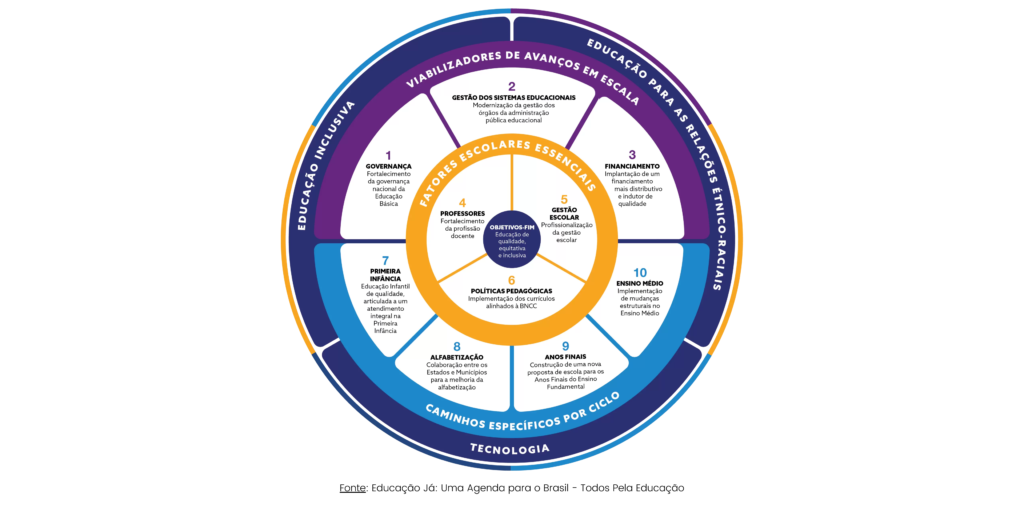Education is a fundamental right and key to social justice. At MBM, we believe it breaks cycles of poverty, creating opportunities for those who face a lack of prospects and opportunities. In this article, we discuss how an integrated look at private social investment in education can drive the future.
João grew up in a neighborhood where dreams and reality didn't seem to interact. Driven by survival, he left school to work in the informal market and never had the opportunity to learn to read and write again. When he became a father, he wanted something different for his son, but, without possibilities and references about the importance of education, he ended up taking him away from the school routine by suggesting that he accompany him to work.
This fictional story represents the experience of many Brazilians, where the lack of access to knowledge and opportunities perpetuates a cycle of poverty that impacts 28% of the Brazilian population in 2024 . According to research by Datafolha, 73% of young people want to return to school but find themselves in the reality of João's son, where they need to work to help their family.
Current Education scenario in the country
Multidimensional poverty goes beyond a lack of income and reflects a broad lack of rights and access to essential resources, such as education. Stories like João's exemplify this reality, where the absence of educational opportunities limits the development of an entire family and community cycle. Today, in Brazil, it takes 9 generations for the descendants of a Brazilian in the poorest 10% to reach the country's average income level.
Although education is a fundamental right guaranteed by the 1988 Constitution, its universalization in Brazil is still a long way off. The challenges are great: of the country's young people (18-29 years old), 8.8 million did not finish high school and do not attend any basic education institution, according to information collected by PNAD Contínua. Considering all age groups, there are more than 68 million citizens without basic education in the country. In 2021, under the effects of the pandemic , only half of children living in a household in the poorest 20% of the population were involved (in person or virtually) in school activities throughout the week, while this was the case for three in every four children in the richest families.
According to Todos Pela Educação, in recent years, Brazil has faced a worrying increase in the non-literacy rate, a drop in the IDEB (Basic Education Development Index) and a reduction in the quality of teacher training, especially among those who choose distance learning (EaD) courses.
Our vision
In the Greater Good Movement, we see education as a transformative force, capable of building a future with fairer opportunities and breaking the cycle of poverty. We believe that it is through education that a more equitable and inclusive society is built. For João and his son to understand the value of learning, a broad approach is needed, which involves the educational context in all its dimensions.
Literacy or after-school initiatives, if done in isolation or on a one-off basis, are not enough. Our vision is comprehensive and considers different levels and demands of the educational system. This includes everything from the professionalization of school management and teachers to the formulation of pedagogical and governance policies, in line with guidelines, as in the Todos Pela Educação mandala below.

It is precisely this refined vision of Brazilian education that makes Todos Pela Educação a fundamental piece. The organization works at the national level to influence public policies and ensure that basic education is prioritized, inclusive, equitable and of quality. Through its strategic action, Todos Pela Educação promotes guidelines to face the main challenges of education in the country, creating a common agenda, in a coalition with other social organizations committed to quality and accessible education for all.
Organizations such as the Iungo Institute , focused on the technical qualification of teachers, are essential to ensure the quality of learning and the technical improvement of educators in the face of contemporary challenges. To this end, it is also important to support and be close to organizations such as Parceiros da Educação , which works to form Education Directorates in São Paulo, through the Sul 1 and Sul 2 projects, strengthening school management to improve educational results.
Another strategic example is the Rodrigo Mendes Institute , which promotes school inclusion through inclusive training programs, training schools and departments for accessible education.
Paying attention to social demands and recent political movements, we direct efforts among these organizations to articulate and implement the National Common Curricular Base (BNCC). The Movimento Pela Base plays an important role in this process, connecting different actors and ensuring that the defined practices reach Brazilian territories effectively.
These are some of the organizations in our portfolio in the education axis, highlighting the importance of treating the complexity of the educational challenge as an interconnected and systemic issue, rather than an isolated one.
Starting point for social transformation
Investing in education means rewriting stories like João’s, offering new perspectives for the next generations. The trajectory of João and so many other families shows that poverty is perpetuated by the lack of opportunities. With actions that embrace the various educational dimensions, MBM aims to be a bridge between the still unexplored potential and human and social development.
By supporting education, we open paths to a more promising future, where each young person can be an essential link in transforming society, overcoming local barriers and inspiring a positive impact that spreads across the country.
What do you think about starting to integrate this perspective into your philanthropic practice?
Stay up to date with all the news for investors and social organizations curated by Movimento Bem Maior, as well as updates on our activities. Subscribe now to Radar MBM , our exclusive newsletter! Receive first-hand relevant content every month about philanthropy, social initiatives and ways to make a difference beyond just donating! Join us! Sign it



 ">
">

